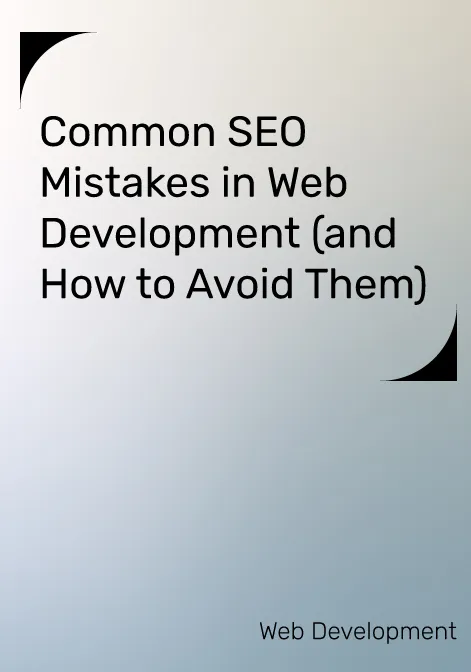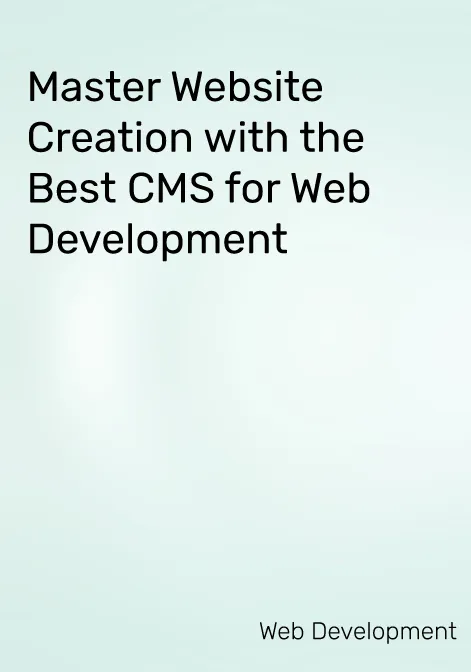However, many web developers make common SEO mistakes that negatively impact their website’s ranking on search engines.
In this article, we will discuss some of the most common SEO mistakes in web development and how to avoid them.
SEO Explanation
SEO is the process of optimizing your website to rank higher on search engines like Google, Bing, and Yahoo. It involves various techniques such as keyword research, on-page optimization, link building, and technical SEO.
SEO importance in web development
SEO is essential for web development because it helps to increase the visibility of your website on search engines. It also helps to drive organic traffic to your site, which can lead to more conversions and sales.
Without proper SEO, your website may not rank well on search engines, and you may miss out on potential customers.
Common SEO mistakes in web development
Slow site speed
Site speed is a crucial factor in SEO. A slow-loading website can negatively impact your website’s ranking on search engines. Users are more likely to leave a website that takes too long to load, which increases your bounce rate.
To avoid this mistake, you should optimize your website’s images, use a content delivery network (CDN), and minimize HTTP requests.
Ignoring search intent
Search intent is the reason behind a user’s search query. Ignoring search intent can lead to a poor user experience and negatively impact your website’s search engine ranking. To avoid this mistake, you should create content that matches the user’s search intent.
You can use tools like Google Analytics and Google Search Console to analyze user behavior and optimize your content accordingly.
Not having an SEO strategy in place
Not having an SEO strategy in place can lead to poor website performance on search engines. An SEO strategy helps to ensure that your website is optimized for search engines and that you are targeting the right keywords.
To avoid this mistake, you should create an SEO strategy that includes keyword research, on-page optimization, link building, and technical SEO.
No effort to enhance the user experience
User experience is a crucial factor in SEO. A website that provides a poor user experience can negatively impact your website’s ranking on search engines.
To avoid this mistake, you should focus on enhancing the user experience of your website. You can do this by improving your website’s navigation, using clear and concise language, and optimizing your website for mobile devices.
Not creating a sitemap
A sitemap is a file that contains a list of all the pages on your website. It helps search engines crawl and index your website more efficiently. Not having a sitemap can negatively impact your website’s ranking on search engines. To avoid this mistake, you should create a sitemap and submit it to search engines like Google and Bing.
Additional Reads: Shopify Vs WordPress
How to avoid common SEO mistakes
Improve your on-site SEO
On-site SEO involves optimizing your website’s content and HTML source code. To improve your on-site SEO, you should focus on optimizing your website’s title tags, meta descriptions, header tags, and content. You should also use internal linking to help search engines crawl and index your website more efficiently.
Add LSI keywords to your page.
LSI (Latent Semantic Indexing) keywords are keywords that are related to your primary keyword. Adding LSI keywords to your page can help search engines understand the context of your content and improve your website’s ranking on search engines. You can use tools like Google Keyword Planner and LSIGraph to find LSI keywords.
Monitor your technical SEO
Technical SEO involves optimizing your website’s technical aspects, such as site speed, mobile-friendliness, and crawlability. To monitor your technical SEO, you can use tools like Google Search Console and GTmetrix. These tools can help you to identify technical issues on your website and fix them.
Match your content to search intent.
Matching your content to search intent is crucial for SEO. To match your content to search intent, you should analyze user behavior and optimize your content accordingly. You can use tools like Google Analytics and Google Search Console to analyze user behavior and optimize your content.
Reduce your bounce rate.
Bounce rate is the percentage of users who leave your website after viewing only one page. A high bounce rate can negatively impact your website’s ranking on search engines.
To reduce your bounce rate, you should focus on enhancing the user experience of your website. You can do this by improving your website’s navigation, using clear and concise language, and optimizing your website for mobile devices.
Publish high-quality content
Publishing high-quality content is crucial for SEO. High-quality content can help to improve your website’s ranking on search engines and drive organic traffic to your site. To publish high-quality content, you should focus on creating original, informative, and engaging content that provides value to your users.
Build backlinks to your site.
Backlinks are links from other websites that point to your website. Backlinks are an essential factor in SEO because they help to improve your website’s authority and ranking on search engines.
To build backlinks to your site, you should focus on creating high-quality content that other websites will want to link to. You can also reach out to other websites and ask them to link to your site.
Track and monitor your results
Tracking and monitoring your results is crucial for SEO. It helps you to identify what is working and what is not working for your website. To track and monitor your results, you can use tools like Google Analytics and Google Search Console.
These tools can help you analyze user behavior, track your website’s ranking on search engines, and identify technical issues on your website.
Include meaningful visuals
Including meaningful visuals in your content can help to improve your website’s ranking on search engines. Visuals can help to break up your content and make it more engaging for your users.
To include meaningful visuals, you should focus on creating high-quality images, videos, and infographics that provide value to your users.
Make your information skimmable.
Making your information skimmable is crucial for SEO. Users are more likely to engage with your content if it is easy to read and understand.
To make your information skimmable, you should use headings, bullet points, and short paragraphs. You should also use clear and concise language that is easy to understand.
Additional Reads: Frontend Development Trends
Conclusion
SEO is an essential aspect of web development. By avoiding common SEO mistakes and following best practices, you can improve your website’s ranking on search engines and drive organic traffic to your site.
Remember to focus on creating high-quality content, optimizing your website’s technical aspects, and enhancing the user experience of your website.




